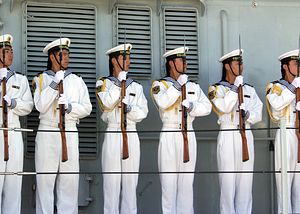Having conducted joint naval exercises recently in the Mediterranean, China and Russia will look to increase their naval cooperation in Asia. Next month, the two countries will conduct a joint naval exercise in the Peter the Great Gulf, the largest gulf of the Sea of Japan, along the coast of Russia’s Primorski Krai. The exercise will take place from August 20 to 28, and focus primarily on improving the interoperability of the two navies and bolstering strategic coordination. The exercise, which is code-named “Joint-Sea 2015-II,” will take place as tensions remain high between China and Japan, who dispute the extent of the exclusive economic zones in the East China Sea, and between Russia and Japan. Russian Prime Minister Dmitri Medvedev recently announced that Russia would accelerate the construction of civilian and military features on the Kuril Islands, which remain disputed between Russia and Japan.
Details about the exercise emerged during a monthly Chinese Ministry of Defense press conference. People’s Liberation Army Senior Colonel Yang Yujun, a spokesperson for the ministry, noted that “purpose of the exercise is to consolidate and develop the China-Russia all-round strategic coordination partnership, to deepen the pragmatic and friendly cooperation between the Chinese and Russian militaries, and to enhance the organization and command capabilities and the levels of the two militaries in jointly conducting the joint traffic defense activities and joint landing activities, so as to further enhance their capabilities of jointly coping with maritime security threats.”
He added that the exercise will include “joint air-defense, joint anti-submarine warfare, joint anti-surface warfare and joint defense.” According to Yang’s comments, the two navies will also conduct joint landing exercises. China will be sending seven People’s Liberation Army Navy ships, “including destroyers, frigates, landing ships and comprehensive replenish vessels,” and, additionally, it will send five aircraft, including airborne early-warning and control aircraft and fighters. The Russians will send a similar assortment of assets to the exercise, including dispatch ships, submarines, and fixed-wing aircraft.
In Tokyo and in Washington, this exercise will be read as another sign of the extent to which China and Russia are aligned in Asia. Relations between Russia and China have waxed and waned over the years, reaching their nadir during the Sino-Soviet split at the height of the Cold War, and, while their interests may not perfectly align on all issues, they cooperate closely as security partners. Notably, Russia’s military cooperation with Beijing has seen a sharp uptick following a general deterioration of its ties with Europe and the United States for its actions in Ukraine, including support for anti-government rebels and the annexation of the Crimean peninsula.

































